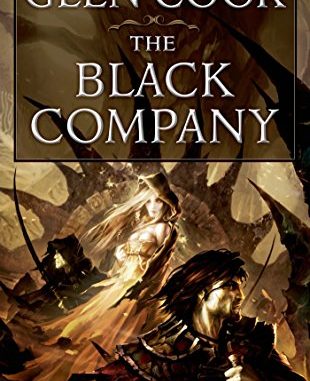
I’m not sure how I missed ‘The Black Company’ for the forty-one years of my life. It’s a fantasy novel that was published in 1984. I was born in 1976. I give myself a grace period for the first twelve to fifteen years of not having reading it. The other 26 to 29 years are a mystery/embarrassment.
I remember groping around in the late eighties and early nineties for decent fantasy books to read and coming up with a seemingly never-ending conveyor belt of Lord of the Rings rip-offs. Now, nothing against LOTR rip-offs, because some of them were pretty good (And also because I later wrote one and it was not pretty good). But ‘The Black Company’ was and is something different. It may have been ground zero for the birth, or rebirth, of the grimdark fantasy genre (When grimdark started is subject to debate, but look to the ‘Conan’ stories by Robert E. Howard and the ‘Elric’ series by Michael Moorcock).
So how is ‘The Black Company’ different than Lord of the Rings?
Let me start by saying that the Black Company from The Black Company is a mercenary band. That means their motivation as a group is less about Nine Walkers bringing the One True Ring to Mordor for destruction and saving the world from darkness than it is about making cold hard cash to spend on gambling, women, and booze. These men are not heroes. These are cold hard men who are good at what they do, and what they do is what you pay mercenary companies to do. And often what you don’t pay them to do.
As an example, if the Black Company were working in Middle Earth, they would probably be working for Sauron. And in ‘Return of the King’ they would probably have sapped under the walls of Minas Tirith while simultaneously slinging sorcerous fireballs and attacking on all fronts with siege engines. On top of all that, behind the scenes, long before the siege even began, the baddest of the bad would have infiltrated the walls of the much vaunted seven-walled city and very likely have murdered Denethor and Faramir and any other nobleman with three or more syllables to their name. In fact, the only person left to lead the defense against the horde invasion would probably have been some dude named Doug who once, in his own words, ‘Used to swing swords with that guy named Boromir. Way back in the day.’
Conventional wisdom theorizes that Doug would not have lead a successful defense campaign against the orc horde.
Which means that Sauron wins.
And Middle Earth falls into shadow.
But most importantly, the Black Company gets paid.
So the Black Company is not a bunch of good guys. There’s not a white hat amongst the bunch. But they’re not morally bankrupt in every sense of the word. There are redeeming qualities amongst its many brethren despite the fact that you wouldn’t want to meet most of them in a dark alley. There are innocents who they save. There are lesser goods perpetrated in the name of greater evil. And there may not be honor amongst thieves, but there is amongst the Black Company. They fight as a unit, always having each others’ backs despite often being at one anothers’ throats. Petty squabbles are thrust aside when the chips are down. Which is often. Sacrifices are made in the name of honor and camaraderie. Ultimate sacrifices. Here are men who fight not for ideals or for king or country but for the man standing next to them in the lines, in the melees, in the trenches.
These are strong men. These are weak men. These are simply men.
So why am I reviewing ‘The Black Company’ some thirty-odd years after it was published? Because it’s good. Because I missed it. Somehow. And because maybe you missed it, too. And because there are ten books in the series. Ten. And that’s a beautiful damn number of books to have to look forward to.
Kevin Wright
-Author of ‘Lords of Asylum’ : http://amzn.to/242AqeO
-Amazon Author Page : http://amzn.to/2noAXKj
I loved “The Black Company.” It’s one of the best military fantasy books out there.
I love the grunt’s eye view of epic fantasy.
It’s arguably a lot less dark than “Game of Thrones” or a lot of other “gritty” fantasy.I think that’s because while there are no white hats, and our heroes aren’t spotless champions of justice, they do have that honor you wrote about. There is something greater than themselves.
They are real men. Violent men. Flawed men. But I think they are among the best of the violent flawed men in fantasy, reflecting the best in violent, flawed men in the real world.